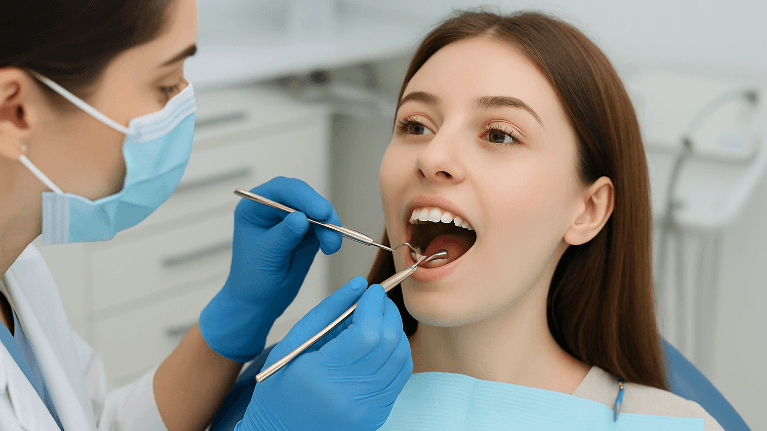
Over the past year, I’ve had a few unexpected opportunities to learn more deeply about what patients go through during a bone marrow transplant. It started with someone close to our family whose life changed overnight after a diagnosis that led to BMT. That experience opened my eyes—not just to the complexity of transplant care, but to the overlooked impact it can have on something as simple and essential as your mouth.
Around the same time, I connected with a fellow dentist who had undergone BMT himself. He had shared his story—openly and bravely—documenting the difficult days of treatment, the pain of mucositis, and the strategies that actually helped him cope. Hearing directly from someone who both understands dentistry and has lived through transplant treatment gave me a whole new level of perspective.
Then, more recently, one of my own patients began preparing for a BMT. It was a chance to put that knowledge into practice—to create a step-by-step oral health guide tailored to his needs, and to walk with him through a season that demands both medical precision and personal care.
That’s why I’m writing this.
Why the Mouth Is So Affected During BMT
Your mouth might seem like a small part of the puzzle during transplant care, but it’s actually one of the most vulnerable areas in your entire body. That’s because the tissues inside your mouth—your cheeks, gums, tongue, and lips—are made up of fast-dividing cells. When chemotherapy and radiation are used to prepare for transplant, those treatments don’t just target unhealthy cells—they also affect any tissues that regenerate quickly. The result? Inflammation, ulcers, pain, dryness, and increased risk of infection, all in a place you use constantly to eat, talk, and smile.
Fortunately, a lot of these complications can be managed—and even minimized—with the right preparation.
What You Should Do Before Transplant
The National Cancer Institute (NCI) and MASCC/ISOO (international oncology-dental guidelines) strongly recommend a comprehensive dental evaluation 2–3 weeks before your BMT. Here’s why:
- Screen for cavities, gum disease, and infection
- Remove non-restorable or high-risk teeth
- Complete urgent dental work to reduce risks later
- Equip you with a personalized oral care plan for treatment
Think of it as “clearing the runway” before takeoff.
Daily Oral Care During Bone Marrow Transplant
Keeping your mouth clean and hydrated is one of the most effective ways to reduce discomfort, prevent infection, and support healing during BMT treatment. Following these recommendations will help at least minimize the discomfort from oral mucositis and help you recover as quickly as possible.
Minimum Daily Routine
- Brush at least twice a day
- Use a soft or ultra-soft toothbrush
- Use prescription-strength fluoride toothpaste (e.g., 5,000 ppm)
- Use sponge swabs (toothettes) only if your platelet count is < 20 × 10⁹/L or brushing is too painful
- Floss or use interdental cleaners gently once per day
- Skip if there is bleeding or if platelet count is low
- Rinse with Biotène® Dry Mouth rinse (or similar saliva substitute)
- Twice daily, especially after brushing
- Swish with sterile saline
- After every bathroom visit (aim for 4–6 times per day)
- Ask your medical team if sterile saline is available
- Chew ice chips throughout the day
- Helps soothe mouth sores, prevent mucositis, and stay hydrated
Alternative Rinse Option
- Salt + Baking Soda Rinse
Mix:
¼ teaspoon salt
¼ teaspoon baking soda
In 8 oz of warm water
Use 4–6 times daily, especially after meals and before bed.
Things to Avoid
Alcohol-based mouthwashes
Tobacco products (including vaping)
Any rinse that burns or causes dryness
Don’t forget your lips:
- Apply plain petrolatum (Vaseline®) or a lanolin-based balm every 2–3 hours or as needed to prevent cracking
After the Transplant: Recovery Isn’t Just Internal
Your mouth may take weeks—or months—to fully heal. We continue to monitor and support you with:
-
Regular dental cleanings and/or exams - recommended every 3 months for the first year
-
Ongoing fluoride therapy if your mouth is dry
-
Screenings for chronic GVHD, infections, and treatment-related decay
-
Education on diet and lifestyle to support your oral health long-term
We’re Here for You—Before, During, and After
We know that undergoing a BMT can be overwhelming. Our team at Bass & Watson Family Dental is here to walk with you through every stage of treatment.
We even provide a free printable BMT Oral Health Guide for our patients and referring providers.
Whether you’re preparing for a transplant or supporting someone who is, reach out to schedule your oral health clearance or consultation today.